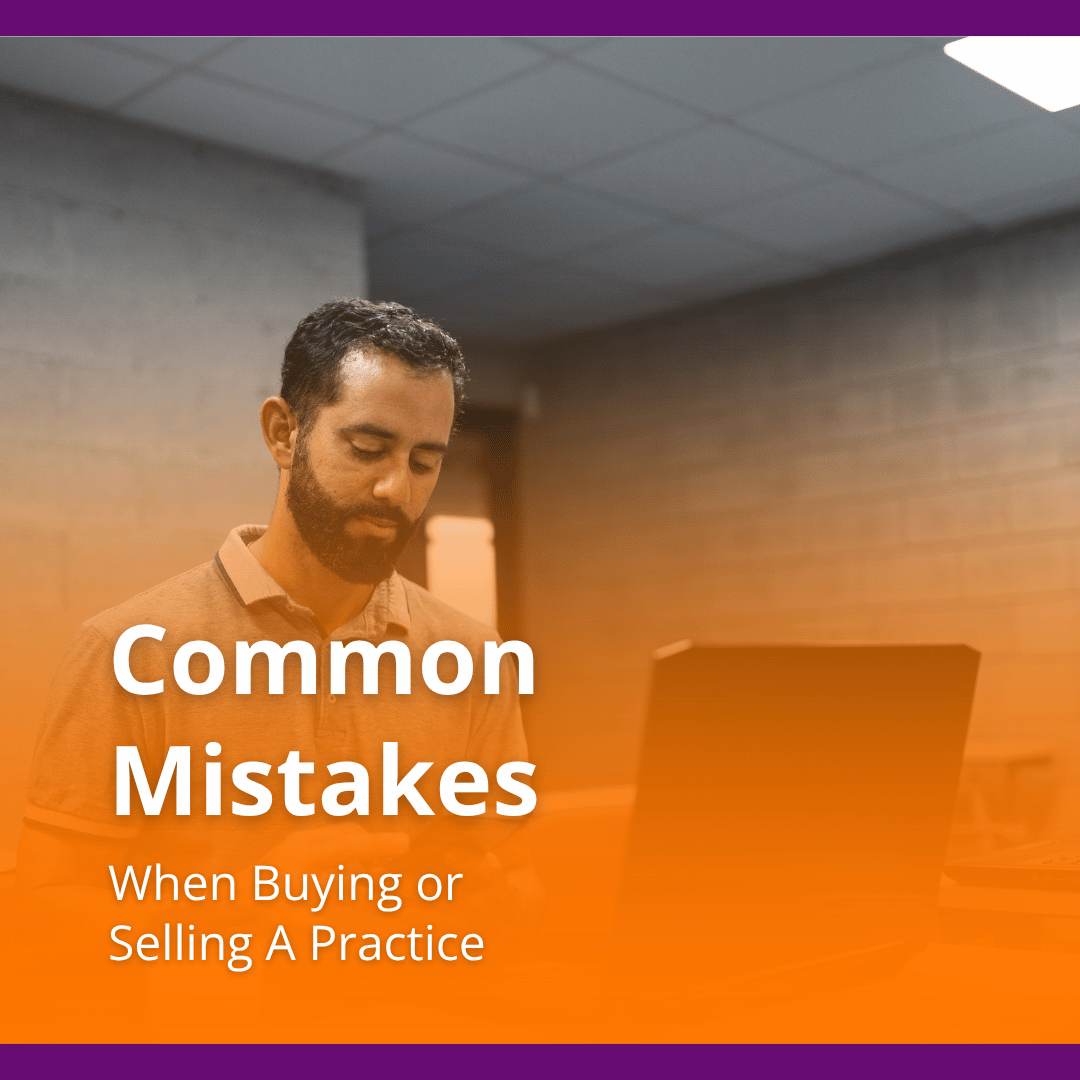How to Know If You’re Emotionally Ready to Sell Your Advisory Practice
You have pictured the day you sell your advisory practice. The deal closes. The pressure lifts.
Comprehensive, data-driven valuations and comparative equity analyses to accurately price your practice, establish market benchmarks, and support informed decision-making.
Comprehensive M&A guidance encompassing deal structuring, negotiation strategies, market listings, and transaction closings.
Comprehensive systems, targeted coaching, and in-depth assessments designed to optimize operational efficiency and enhance advisory team effectiveness.
Strengthen continuity through the implementation of formal continuity agreements, the establishment of legal entities, execution of enforceable legal contracts, and securing appropriate capital resources.

Buying or selling a practice can be an exciting event. It can also become a challenging experience if you’re not prepared. Here are some of the most common mistakes we see people make.
Production numbers are important, but they are not the biggest factor in the success or failure of a deal. The client base, the personality of the advisors, the teams and systems in place are often more indicative of a successful match. Likewise, the terms of the deal can be as important as the numbers. Because many advisors have never completed these types of deals, they only negotiate the numbers and not the terms. They fail to account for the non-numeric portions of the deal that can have real economic consequences in the future.
Sometimes it takes a fresh pair of eyes to help advisors assess the strengths and weaknesses of their practices. Because they don’t know how they stand out – good or bad – they don’t know how to position themselves to put their best foot forward. They may also not know how to properly assess the value proposition of the reciprocal party. Recognizing and communicating each sides’ value proposition is essential to attracting the right people and creating alignment in the deal, yet few advisors do this well.
Buying or selling a practice can be an exciting event. It can also become a challenging experience if you’re not prepared. Here are some of the most common mistakes we see people make.
Production numbers are important, but they are not the biggest factor in the success or failure of a deal. The client base, the personality of the advisors, the teams and systems in place are often more indicative of a successful match. Likewise, the terms of the deal can be as important as the numbers. Because many advisors have never completed these types of deals, they only negotiate the numbers and not the terms. They fail to account for the non-numeric portions of the deal that can have real economic consequences in the future.
Sometimes it takes a fresh pair of eyes to help advisors assess the strengths and weaknesses of their practices. Because they don’t know how they stand out – good or bad – they don’t know how to position themselves to put their best foot forward. They may also not know how to properly assess the value proposition of the reciprocal party. Recognizing and communicating each sides’ value proposition is essential to attracting the right people and creating alignment in the deal, yet few advisors do this well.
Advisors often have preconceived ideas about standard prices (some multiplier of production). They may also have ideas about how deals are financed. So much has changed in the past few years in terms of financing, terms, and ways the value is measured. Not knowing all of the options and alternatives can limit an advisor’s choices. We want advisors to see all of their options – the different methods of calculating practice value, the different types of financing options, the benefits and drawbacks of different types of deals – so that they can find the best fit for their unique situation.
Many advisors feel that they need to sell their practice to whoever is in their local area. They do handshake deals with the other financial advisor down the road and hope for the best. Today, many practices and potential buyers have highly scalable practices where they service several remote client bases. They have the teams, technology, systems and flexibility to offer exceptional service to the clients, regardless of the location. In many cases, they can offer so much more to the clients than the advisor down the road. Limiting oneself to who is in their geographical area can outrule many better-qualified candidates.
In this digital era, more and more connections and relationships are online – shopping, social interactions, dating, recruiting, and more. Why not have a matching service for financial advisors to sell their practices online? In concept, this makes sense, but from our experience, the success of a match and resulting relationship does not come from the digital platform, rather it comes from the positioning of the parties before they go on the platform, and how they interact once they are introduced.
Advisor Legacy is not a digital DIY platform – it is a team of people who will ensure that you are putting your best foot forward. We ensure that you know your true worth and that you clearly articulate your value proposition to the other party. We ensure that you negotiate for deals and terms that will benefit you in the long run, and that you pick prospective partners who align with your values. Online marketplaces are only successful when advisors know to position themselves for the right kinds of matches. They must know how to actively recruit connections, and they must know how to screen and negotiate with their potential partners. This is the most important part of the matching process, yet it is where most advisors fall short.

Todd Doherty serves as Vice President for Advisor Legacy, where he leads advisors through the full M&A lifecycle—readiness, valuation analysis, buyer/seller matching, due diligence, and post-close integration. With more than 15 years in senior roles at financial advisory firms and hands-on ownership experience, Todd brings an operator’s lens to every engagement. His writing focuses on practical ways to boost enterprise value, structure win-win deals, and avoid execution risk. Todd collaborates closely with the firm’s valuation, lending, and legal partners to help advisors make confident, data-driven decisions.
Receive timely articles, tip sheets, events, and more right in your inbox.

You have pictured the day you sell your advisory practice. The deal closes. The pressure lifts.

Selling a company is often the largest financial event of a business owner’s life. Yet most exit conversations still revolve around valuation and...

Are you preparing to sell your business with a team you want to keep intact? Then you’re already thinking ahead. The moment a sale is in motion, your...